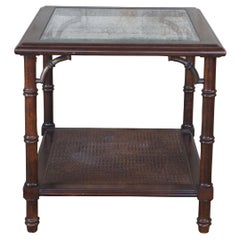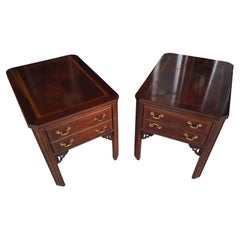Lane Chippendale End Tables
Recent Sales
Late 20th Century Chinese Chippendale End Tables
Faux Bamboo, Cane, Glass, Walnut
Late 20th Century American Chippendale End Tables
Brass
Mid-20th Century American Chippendale End Tables
Mahogany
Late 20th Century American Chippendale Side Tables
Mahogany
Late 20th Century American Chippendale Side Tables
Brass
Lane Furniture for sale on 1stDibs
When the first iteration of the Lane Furniture company began to produce its now-famous Lane cedar chests in the early 20th century, the family behind the brand was unsure of how successful they’d be, so they initially didn’t bother adding their name to the offerings.
The manufacturer was off to a modest start but the family was industrious: The Lanes were made up of farmers and contractors who’d built more than 30 miles of the Virginian railroad. They owned a cotton mill and purchased thousands of acres of land in Campbell County, Virginia, where the Virginian railroad was intended to cross the main line of the Southern Railway.
The Lanes hoped to start a town in this region of the state, and by 1912, streets for the town of Altavista had been laid out and utility lines were installed. In the spring of that year, John Lane purchased a defunct box factory at a bankruptcy auction. His son, Edward Hudson Lane, was tasked with the manufacturing of the cedar “hope” chests for which the Lane family would become known, even though the company was initially incorporated as the Standard Red Cedar Chest Company.
The Standard Red Cedar Chest Company struggled in its early days but introduced an assembly system at its small factory after securing a contract with the federal government to produce ammunition boxes made of pine during World War I. The company prospered and applied mass-production methods to its cedar-chest manufacturing after the war, and, in 1922, rebranding as the Lane Company, it implemented a national advertising campaign to market its products.
Ads tied the company’s strong cedar hope chests to romance. Anchored by copy that read “The gift that starts the home,” the campaign rendered a Lane cedar chest a necessary purchase for young women to store linens, clothing and keepsakes as they prepared to marry.
Wartime production during World War II had Lane producing aircraft parts. In the 1950s, the family-owned company began to branch out into manufacturing tables, bedroom pieces and other various furnishings for the entire home. Today, the brand’s vintage mid-century furniture — which includes the Perception, Tuxedo and Acclaim collections — is highly sought after.
Designed by Andre Bus, Lane’s Acclaim furniture collection of coffee tables, end tables, dressers and more has been compared to Drexel’s wildly popular Declaration series for its blend of traditional craftsmanship and the impeccably clean contours that are frequently associated with the best of mid-century modern design.
Ads for the Acclaim line suggested that it included “probably the best-selling table in the world.” Before its offerings expanded to include items for the bedroom and dining room, Lane was primarily known for its tables and case pieces — there are side tables, coffee tables and more created by Bus in the Acclaim collection, each sporting graceful tapered legs and dovetail inlays.
Later, during the 1960s, Lane offered handsome modular wall units created by the likes of Paul McCobb, an award-winning Massachusetts-born designer best known for his work at Directional.
The company was acquired by United Furniture Industries in 2017 and became particularly well-known among contemporary consumers for its upholstered furniture. In 2022 United abruptly closed and ceased operations at Lane.
Vintage Lane furniture is generally characterized by relatively neutral styles, which are versatile in different kinds of interiors, as well as good quality woods and careful manufacturing. All of these attributes have made Lane one of the most recognizable names in American furniture.
Browse storage cabinets, side tables and other vintage Lane furniture on 1stDibs.
Finding the Right End-tables for You
Beyond just providing additional tabletop space for your living room, an attractive vintage end table can help you organize as well as display books and decorative objects.
The term “end table” is frequently used interchangeably with “coffee table,” and while these two furnishings have much in common, each offers their own distinctive benefits in your space.
Your end table is likely going to stand as tall as the arms of your sofa, and its depth will match the seating. These attributes allow for tucking the table neatly at the end of your sofa in order to provide an elevated surface between your seating and the wall. End tables are accent pieces — they’re a close cousin to side tables, but side tables, not unlike the show-stealing low-profile coffee table, are intended to be positioned prominently and have more to do with the flow and design of a room than an end table, which does a great job but does it out of the way of everything else.
End tables with a drawer or a shelf can easily stow away books or television remotes. Living-room end tables frequently assist with lighting, specifically as they’re often positioned adjacent to a wall. Their height and compact tabletop render them ideal for table lamps and plants, particularly if parked near a window.
And given their practicality, there is no shortage of simple, streamlined end tables from mid-century modern favorites such as Baker Furniture Company, Dunbar and Knoll that will serve your clutter-clearing minimalist efforts or wide-open loft space well. But over the years, furniture designers have taken to venturesome experimentation, crafting tables from fallen trees, introducing organic shapes and playing with sculptural forms, so much so that your understated end table might eventually become the centerpiece of a room, no matter where you choose to place it. One-of-a-kind contemporary designs prove that there are endless options for what an end table can be, while furniture makers working in the Art Deco style have proven that end tables can be stacked, staggered and nested at will, creating all kinds of variations on this popular home accent.
Find an extraordinary variety of antique, new and vintage end tables on 1stDibs today.
- 1stDibs ExpertMarch 13, 2024United Furniture took over Lane Furniture in 2017. After that, the furniture maker became well known among contemporary consumers for its upholstered furniture. In 2022, United abruptly closed and ceased operations at Lane due to financial problems. Find a collection of Lane Furniture pieces from some of the world's top sellers on 1stDibs.
- 1stDibs ExpertMarch 13, 2024Yes, Lane Furniture was made in the USA. The American furniture maker produced most of its pieces at factories located in North Carolina and Mississippi. However, Lane Furniture stopped manufacturing pieces in 2022. Shop a large selection of Lane furniture from some of the world's top sellers on 1stDibs.

